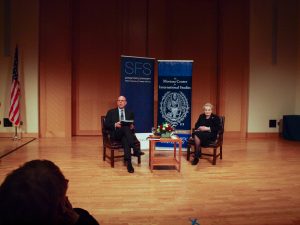Georgetown’s Initiative for U.S.-China Dialogue on Global Affairs hosted a viewing of a webcast in which Condoleezza Rice discussed U.S-Chinese relations. The viewing was held at the Mortara Center for International Studies on Oct. 9.
Organized by the National Committee on U.S.-China Relations, the talk was broadcasted in over 100 venues in 44 U.S. States and three Chinese cities.
Rice called for scientific and economic competition between the United States and China to be balanced with a mutual commitment to international law and equitable trade agreements. Rice acknowledged that tensions between both countries had been long growing, but argued that the two countries can still find common ground. She suggested the United States support the Asian Infrastructure Investment Bank, a controversial new development bank led by China.
Regarding President Donald Trump’s tariffs, Rice expressed support for free trade. However, she argued that the United States should require that any privileges it offers Chinese investors be reciprocated by China. Rice also defended student visa programs for Chinese students, which the Trump Administration has considered ending.
She urged Americans to be as curious about China as the Chinese are about them, calling for opportunities to bring U.S. citizens face to face with their Chinese counterparts.
Before the webcast began, Dennis Wilder, managing director of the Initiative on U.S.-China Dialogue and professor of Asian Studies, and Mike Green, director of the Asian Studies program, led a discussion on Sino-American relations, focusing particularly on Trump’s policies regarding China.
Green used his experience working on two 2016 presidential campaigns as a gauge for how Trump has acted towards China. “Any candidate — except maybe Bernie Sanders — would have taken a tougher line on China,” Green said, citing growing Chinese hostility to U.S. power in Asia.
Various members of the audience echoed the panel’s sentiments.
Zhihang Du (MSFS ’20) believed that the discussion was an essential one. In 2017, Du participated in Georgetown’s U.S.-China Student Fellowship program, which selects a small group of American and Chinese undergraduates to meet in Washington and Beijing, where they discuss international issues and meet with diplomatic leaders. “The U.S.-China relationship is one of the most important in the world,” she said. “I wanted to have my own insights by learning what is actually happening.”
Kishore Mahbubani, Singapore’s former permanent representative to the United Nations, agreed with Green that tension between the powers had been bubbling.
“You have two giants trying to occupy the same space. The space hasn’t grown, but the giants have grown,” Mahbubani said.




